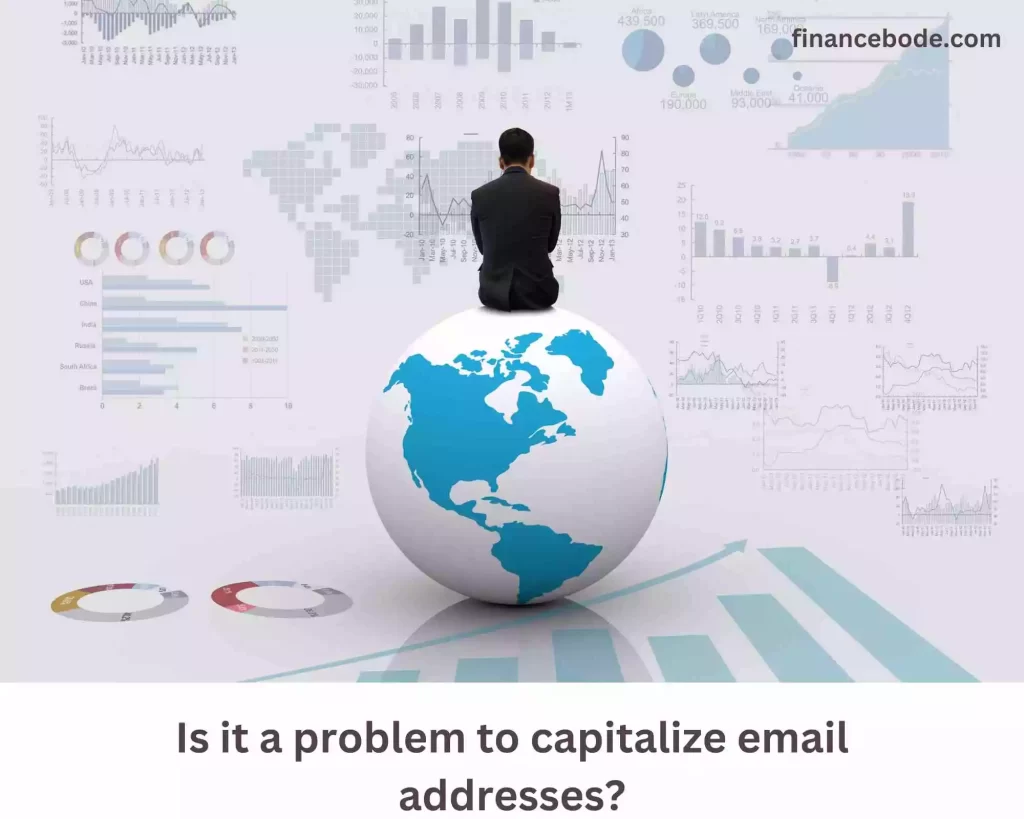Are email address case sensitive? Does it make a difference whether we capitalize all or any letter? What happens when you unintentionally add an uppercase character while inputting a customer’s email address? Will it still deliver?
In this post, I will assist you in exploring the question are email address case sensitive. At the same time, you also discover other essential strategies to use email capitalization to capture recipients’ attention.
See also: The best color to use in email marketing for better conversion.
Are Email Address Case Sensitive
Are email address case sensitive? NO! The email address is not case-sensitive.
However, the local mailbox component (username) is case-sensitive.
The ReCipiENt@eXaMPle.cOm email address is technically different from recipient@example.com (although it’s the same as ReCipiENt@example.com).
Put: Only username is case sensitive. The situation does not impact email addresses.
However, this is only sometimes true. The sensitivity of email addresses may produce a lot of misunderstanding, interoperability concerns, and typical headaches.
This is why some email providers and customers adjust the issue for you or skip the case completely, considering both circumstances as equal.
Almost every email provider or ISP mandates sensitive email addresses. This implies that even if the letters are meant to be upper/lowercase but are not, the emails that are not returned are invalid.
Here’s what this means:
- It usually doesn’t matter where you write an email address when you send a message
- However, if the receiver has supplied you with a different email address, maintain it
- You should only use lowercase characters when establishing a new email address to minimize any misunderstanding
Is It A Problem To Capitalize Email Addresses?
Short answer: No!
As I explained earlier. An email address may start with a capital letter or contain an uppercase letter in the lesson.
If you, by chance, uppercase your email, don’t worry. Unlike passwords, email addresses are not case-sensitive.
Whether you add uppercase or not, today’s email servers interpret it the same way as long as the numbers and letters match your email address.
For example, the following spellings all produce the same email address:
You must, however, keep this in mind. Uppercase and lowercase don’t affect the email address, yet they technically route to two separate mailboxes.
What Are The Different Elements Of An Email Address?
Uppercase or lowercase letters may not influence an email address, but other characteristics may. Email addresses contain two parts: the unique address and the domain.
The local component is the section before the @ sign. For example, the component you chose, like your name or a string of letters and numbers, represents you.
The domain portion is the component that comes after the @ sign. For example, it may be gmail.com or yahoo.com. Or it might be your company domain.
Technical Differences Between Uppercase And Lowercase Emails
An email address consists of two parts, as I explained earlier:
- Include any characters after @. It symbolizes your email server. For example, gmail.com, outlook.com, and financebode.com.
- Includes everything before @. It declares the email account owner.
In turn, we shall investigate each aspect to explain if capitalization is different from lowercase email addresses.
Capitalize the domain name — the section following the @ character
Domain names are not case-sensitive in email addresses, just like any site on the internet.
So, if you put GMAIL.COM instead of gmail.com into your browser, you’ll still have access to the same destination.
This is because the file transmission technology – File transmission technology (FTP) – ignores domain capitalization.
You may enter Gmail@finanCEBOde.com or GMAIL@FINANCEBODE.COM. Both lead to the same outcome.
For this reason, capitalization of the domain component of an email address does not impair its deliverability in any way.
Capitalize unique addresses — the section before the @ symbol in the email
With a unique address (the first portion of the email, also known as the local component), things become a bit more tricky.
For email to be delivered and received across multiple mailbox providers (Gmail, Yahoo, Outlook, etc.), every email firm has to comply with a set of rules called the RFC protocol.
This protocol suite has seen various changes throughout the years.
The newest edition of RFC 5336, an enhancement of SMTP (Simple Mail Transfer Protocol), stipulates that the initial component of an email address (unique address) may be case-sensitive.
For the aforesaid reason, certain servers can host two different mailboxes when the prefix @ is capitalized.
youraddress@domainname.com and YourAddress@domainname.com will lead to distinct mailboxes.
However, in actuality, this option seldom occurs. Only obsolete email servers employ this strategy.
The five primary services (Gmail, Yahoo Mail, Hotmail, Outlook, and Apple Mail) all treat addresses as case-insensitive.
For this reason, keeping lowercase characters of email addresses to prevent any possible difficulties is recommended.
Can You Use Numerals In An Email Address?
Yes, numbers can be used in email addresses.
However, numbers are unusual in the professional game. Some bigger corporations use numbers to differentiate between distinct staff employees with the same name
Yet, best practice would normally be to use one of these naming conventions:
To retain a professional image, you may avoid using digits in lieu of letters, such as financebode3@yourcompany.com.
Which Words Should Not Be Capitalized In Email?
There are words that should not be capitalized In emails. Words like
- a, an, the
- : and, but, for, nor, or, so, yet
- : by, for, from, in, of, on, to, with
- about, after, again, along, around, at, before, behind, below, under, alongside, between, by, down, during, except, for, from, in, into, near, of, off, on, out, over, past, since, through, too, toward, under, till, up, upon, with, inside, outside
These words should not and never be capitalized in email because they perform a grammatical role in a phrase but do not relate to particular persons, places, or objects.
Capitalizing words like this might make your email subject lines appear unprofessional and crowded.
How Do You Capitalize In An Email? (Best Practices)
Here are the best practices for utilizing capitalization in your sales and marketing emails.
Avoid using capitalization in subject lines.
The established best practice is to avoid overusing capitalization in topic lines. By this, we’re talking about all capitals, as in “THIS IS MY EMAIL SUBJECT LINE.”
While some marketers have A/B tested all-caps subject lines and achieved positive results (increased open rates), the concern with this technique is that you risk activating a spam filter.
Fully-capitalized email subject lines might look spammy since capitalization is commonly used to portray urgency (a practice fraudsters depend on).
Therefore, even if your email is authentic, your customer’s spam filter can opt not to allow you through.
Fully lowercase subject lines
On the other hand, drafting email subject lines solely in lowercase (small letters) might be useful.
Some marketers discover that lowercase subject lines may enhance open email rates. Others find the reverse.
While, like uppercase subject lines, the verdict is still out (i.e., your results may vary), lowercase normally isn’t recognized as a spam trigger. Therefore, it mitigates the danger of landing placed in a spam folder.
However, the possible rise in click-through and reply rates is one of many things to weigh up here.
Some audiences may consider the usage of lowercase as unprofessional (it is, after all, technically improper not to start a phrase with a capital letter). Others may prefer it.
Be wary of assuming that certain groups, especially younger generations raised with the internet and “text-speak,” are less concerned with traditional grammar conventions.
The greatest advice is to do your testing.
Even if lowercase satisfies your style standards (for instance, your brand persona is on the more informal end of the spectrum), set up an A/B test in your email marketing software to see if the fully-lowercase email subject lines have an impact on your audience.
Conclusion
Now I believe have cleared up the debate about using caps in email addresses.
So do capital letters matter in email addresses? When it comes to email marketing, it’s preferable to avoid capitalizing the sender’s address.
Most readers don’t like this since it reminds them of unwanted sales advertising emails.
However, this doesn’t mean that you should absolutely avoid capitalization. Uppercase letters may be used to express passion and excitement while also creating a sense of urgency.
For example, if you’re an e-commerce business operating email marketing for year-end deals, a fair bit of capitalization in the message may be suitable.





